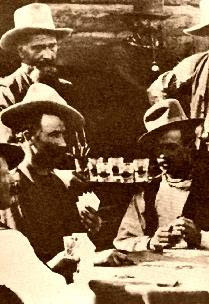Saturday, July 16, 2011
Philosophical Poker
 I've beem remiss in blogging of late for various reasons, so I thought I'd revive some older posts for those who don't obsessively comb through my previous efforts. Feel free to ignore this ... although it has some relevance to an ongoing discussion in a comment discussion here.
I've beem remiss in blogging of late for various reasons, so I thought I'd revive some older posts for those who don't obsessively comb through my previous efforts. Feel free to ignore this ... although it has some relevance to an ongoing discussion in a comment discussion here.May 25, 2010:
Jerry Coyne and Karl Giberson are having at each other, which all but guarantees that there will be a lot of talking past each other.
Coyne opens with this interpretation of Giberson:
Science and faith are compatible because there are lots of religious scientists. Some of them have even won Nobel Prizes!
Hello? Anybody listening out there? Earth to Giberson: no New Atheist has ever denied that faith and science can be "compatible" in the sense that both can be simultaneously embraced by one human mind. The argument is, and always has been, about whether science and faith are philosophically compatible. Do they clash because they deal with "data" in disparate ways? Do they have completely different standards for judging "truth"? I say "yes," and assert that religious scientists exist in a state of cognitive dissonance.
Coyne's next complaint is that Giberson accuses him of attacking theists who are scientists personally. Specifically, Giberson complained that:
... Coyne raked Brown University cell biologist Ken Miller and me over the coals in The New Republic for our claims that Christians can unapologetically embrace science.
Giberson and Miller are thoughtful men of good will. Reading them, you get a sense of conviction and sincerity absent from the writings of many creationists, who blatantly deny the most obvious facts about nature in the cause of their faith. Both of their books are worth reading: Giberson for the history of the creation/ evolution debate, and Miller for his lucid arguments against intelligent design. Yet in the end they fail to achieve their longed-for union between faith and evolution. And they fail for the same reason that people always fail: a true harmony between science and religion requires either doing away with most people's religion and replacing it with a watered-down deism, or polluting science with unnecessary, untestable, and unreasonable spiritual claims.
I have to wholeheartedly agree with Coyne on one point: Giberson is wrong about this:
For the sake of argument, let us set aside questions about the truth of religion vs. the truth of science. Suppose there is no such thing as religious truth, as Richard Dawkins argued in The God Delusion. Allow that the "New Atheist Noise Machine," as American University communications professor Matt Nisbet calls it, has a privileged grasp of the truth. Even with these concessions, it still appears that the New Atheists are behaving like a boorish bunch of intellectual bullies.
There is something profoundly un-American about demanding that people give up cherished, or even uncherished, beliefs just because they don't comport with science. And the demand seems even more peculiar when it is applied so indiscriminately as to include religious believers with Nobel Prizes. What sort of atheist complains that a fellow citizen doing world-class science must abandon his or her religion to be a good scientist?
Our commitment to pluralism and individual freedom should motivate generosity in such matters and allow people "the right to be wrong," especially when the beliefs in question do not interfere with us. Nothing is gained by loud, self-promoting and mean-spirited assaults on the beliefs of fellow citizens.
The New Atheists need to learn how to play in the sandbox.
Of course, that means Giberson is just as free to play his cards as Coyne is to play his. Only time will tell who has the better hand in that game.
.



